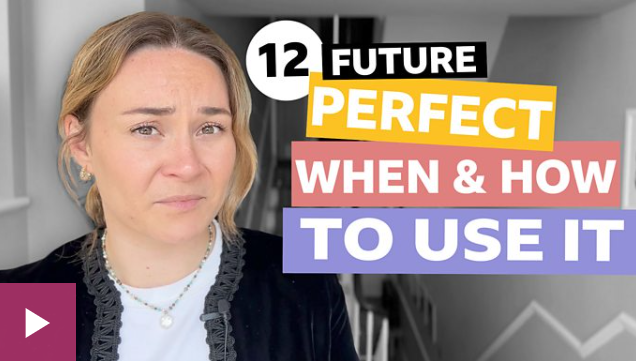USES OF FUTURE PERFECT
Things that will be completed before a specific time in the future.
- I hope that by next Wednesday I will have finished the project.
- The builders will have fixed the roof by Thursday.
- Visit us here before July, otherwise we will have moved out and you won’t be able to see this house.
Things that won’t be completed before a specific time in the future.
- I won’t have finished the project by next Wednesday. Can you give me more time?
- I won’t have collected everything we need for the meeting by tomorrow. Can we reschedule?
- She won’t have graduated by then so she won’t be ready to start work.
To talk about achievements that we expect to be completed by a certain time.
- By the time I’m 30, I’ll have produced hundreds of videos.
- I’m hoping we will have mastered this choir piece before the concert.
- By the end of my summer in Valencia, I hope my Spanish will have improved a lot.
Useful vocabulary to be used with the future perfect: by, by the time, before
STRUCTURE
For positive sentences, use ‘will have’ after the pronoun, plus the verb in the past participle form. We often contract the form with an apostrophe.
- I will have walked > I‘ll have walked
- You will have walked > You‘ll have walked
- He will have walked > He‘ll have walked
- She will have walked > She‘ll have walked
- It will have walked > It‘ll have walked
- We will have walked > We‘ll have walked
- They will have walked > They‘ll have walked
For negative sentences, add ‘not’ after ‘will’. We usually contract the form with an apostrophe.
- I will not have walked > I won’t have walked
- You will not have walked > You won’t have walked
- He will not have walked > He won’t have walked
- She will not have walked > She won’t have walked
- It will not have walked > It won’t have walked
- We will not have walked > We won’t have walked
- They will not have walked > They won’t have walked
To ask yes/no questions, change the order of the sentence so that ‘will’ is at the beginning.
- Will I have walked?
- Yes, you will have
- No, you won’t have
- Will you have walked?
- Yes, I will have
- No, I won’t have
- Will he have walked?
- Yes, he will have
- No, he won’t have
- Will she have walked?
- Yes, she will have
- No, she won’t have
- Will it have walked?
- Yes, it will have
- No, it won’t have
- Will we have walked?
- Yes, we will have
- No, we won’t have
- Will they have walked?
- Yes, they will have
- No, they won’t have
To ask for more information, add the ‘who, what, where, why, how, when’ question words at the beginning.
- Why will I have walked?
- Who will you have walked with?
- Where will he have walked?
- When will she have walked?
- How will they have walked?
- When will they have walked?
